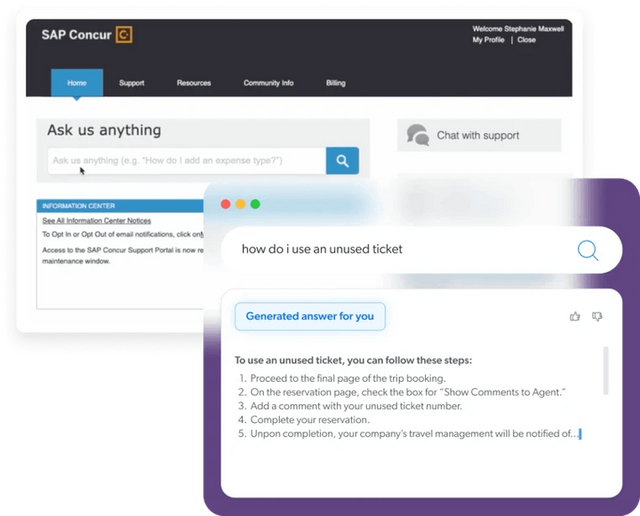
Navigating Digital Customer Service: Strategies for Success
Explore digital customer service and why its crucial for modern businesses. Boost engagement & excel in the digital landscape with Coveo.

In today’s fast-evolving business landscape, companies are constantly rethinking how they interact with customers.
Traditional customer service models often fall short of modern demands. Digital customer service has emerged as a crucial solution to enhance customer satisfaction, operational efficiency, and long-term business success.
But what exactly is digital customer service, and why is it so vital for businesses in today’s market?



Understanding Digital Customer Service
Digital Customer Service Tools & Technologies
AI-Powered Chatbots
Self-Service Portals
A defining feature of digital customer service is omnichannel support, ensuring that customers can seamlessly transition between different platforms. For example, a customer might begin a conversation through a chatbot on a website, continue it via email, and conclude it on social media, without losing context or having to repeat themselves.
This cohesive experience is key to maintaining customer satisfaction and fostering long-term loyalty. Companies that prioritize digital transformation in customer service report higher retention rates, operational efficiency, and overall customer satisfaction. As consumers demand faster and more personalized responses, DCS has evolved from being a luxury to an essential element of modern business strategy.
To deliver exceptional digital customer service, businesses need a range of powerful tools and technologies. These tools enable companies to manage a higher volume of inquiries with less effort while providing real-time support and a personalized experience across all customer touchpoints.
AI-powered chatbots are essential for handling a high volume of routine customer inquiries quickly and efficiently. By analyzing customer behavior, preferences, and past interactions, chatbots can provide personalized solutions in real time, reducing wait times and enhancing customer interactions.
These bots allow businesses to streamline their operations by automating repetitive tasks, enabling human agents to focus on more complex or sensitive inquiries.
Advanced AI capabilities have transformed chatbots from simple response tools to highly intuitive systems capable of understanding natural language, delivering tailored answers, and learning from interactions. This level of automation enhances the customer experience while reducing operational costs for businesses. For instance, Coveo’s AI-driven solutions help businesses automate customer support processes, enabling agents to deliver more effective service with less manual effort.
Customers increasingly prefer to resolve issues on their own, and self-service portals empower them by offering access to a wealth of resources such as FAQs, how-to guides, and instructional videos. These portals allow customers to find answers independently, reducing the need for direct interaction with customer service agents.
This not only increases customer satisfaction but also lowers operational costs by reducing the number of inquiries agents need to handle.
To make self-service portals even more effective, businesses can integrate intelligent search capabilities like generative answering that deliver relevant answers based on customer intent and previous interactions. This ensures that customers can quickly and easily find the information they need, further improving their experience.
AI-enhanced search technologies, like those offered by Coveo, help businesses provide more accurate and personalized search results, enabling faster issue resolution.
Digital customer service refers to the use of digital tools and platforms to provide customer support, resolve issues, and enhance customer interactions across various touchpoints such as websites, mobile apps, and messaging platforms. It enables businesses to meet customers where they are most active, delivering timely and personalized responses that build satisfaction and loyalty.
Unlike traditional customer service, which relies on face-to-face or phone-based communication, digital customer service operates 24/7. This allows businesses to scale their operations and provide quicker resolutions by leveraging AI-driven tools and integrated communication channels, reducing the need for human intervention while improving service quality.
Omnichannel Support Systems
As customers engage with businesses across multiple digital platforms — including social media, live chat, email, and messaging apps — it is essential for companies to provide a seamless experience across all channels.
Omnichannel support ensures that customers can move between platforms without losing the context of their interaction. For instance, a conversation started on Twitter can easily continue on live chat, and the customer won’t need to repeat themselves. Coveo’s AI-powered platform integrates seamlessly into omnichannel systems, providing businesses with the tools they need to offer a unified, consistent customer experience across all touchpoints.
This approach not only improves customer satisfaction but also helps businesses build trust and loyalty by offering a cohesive service experience, regardless of how customers choose to engage.

Benefits of Adopting Digital Customer Service
For instance, SAP Concur significantly improved their customer experience and operational efficiency by implementing Coveo’s AI-powered customer service solutions. Through automation and personalization, they reduced wait times and improved customer satisfaction, demonstrating the tangible business benefits of adopting a digital-first customer service strategy.
The shift toward digital customer service brings significant advantages for businesses, improving both the customer experience and overall operational performance. Some of the key benefits include:
- Improved Efficiency: Automation allows businesses to handle routine tasks — such as answering FAQs, routing inquiries, and processing transactions — without human intervention.
This reduces the burden on customer service agents, allowing them to focus on more complex or high-impact issues. Automated tools also minimize human error, improve accuracy, and ensure that customers receive prompt, reliable service.
- Scalability: As businesses grow, their customer service needs expand. Digital customer service tools are inherently scalable, meaning they can handle larger volumes of inquiries without requiring additional resources.
Whether it’s during peak times or as customer demand increases, these tools ensure that businesses can keep up without compromising service quality. - Increased Customer Satisfaction: Today’s customers expect quick, efficient service. Digital customer service solutions enable businesses to meet these expectations by providing real-time support, instant responses, and personalized assistance.
AI-driven chatbots, self-service portals, and omnichannel systems allow businesses to resolve customer issues faster, leading to higher satisfaction rates. - Personalized Interactions: Personalization is becoming a cornerstone of customer service. By understanding customer intent, AI-powered tools can analyze data from previous interactions and provide tailored solutions that enhance the overall experience.
Personalized recommendations not only increase customer engagement but also foster stronger relationships between businesses and their customers. - Cost Savings: Automation and self-service tools help businesses reduce their reliance on large customer service teams, lowering operational costs. By automating repetitive tasks, companies can allocate resources more efficiently and reduce overhead expenses without sacrificing service quality.
Overcoming Challenges in Digital Customer Service
By addressing these challenges, businesses can fully unlock the potential of digital customer service. Strategies for overcoming common obstacles include ensuring seamless technology integration, safeguarding data privacy, and maintaining a personalized approach to customer interactions.
As technology continues to advance, several key trends will shape the future of digital customer service:
- AI and Machine Learning: AI and machine learning are revolutionizing customer service by predicting customer needs, offering proactive solutions, and automating routine tasks. These technologies enable businesses to provide faster, more accurate responses while also personalizing interactions at scale. As businesses continue to adopt AI, they will be able to deliver more efficient and tailored customer experiences.
- Voice Assistants and Chatbots: Voice assistants and AI chatbots are becoming increasingly sophisticated, enabling businesses to handle more complex customer inquiries through natural language processing (NLP) and real-time responses.
These technologies will play a larger role in providing instant customer support, improving both customer satisfaction and operational efficiency. - Omnichannel Support: As customers engage with businesses across a variety of platforms, they expect a consistent experience regardless of how they reach out. Omnichannel support will continue to be a key trend, as businesses work to provide seamless transitions between channels like social media, email, live chat, and more.
Companies that invest in omnichannel support will see higher levels of customer satisfaction and loyalty, making it a critical area of focus for businesses looking to enhance their digital customer service strategies.
By staying ahead of these trends and adopting the latest technologies, businesses can continue to deliver exceptional customer service and meet the growing expectations of modern customers.
Despite the clear benefits, transitioning to digital customer service does come with challenges. Some of the most common obstacles include:
- Technology Integration: Integrating new digital tools with existing systems is often one of the biggest challenges for businesses. When tools don’t work together seamlessly, it can lead to data silos, fragmented customer experiences, and operational inefficiencies.
Coveo’s AI-powered platform is designed to integrate seamlessly with existing systems with 30+ native and universal connectors, ensuring a unified customer experience without disruption. - Data Privacy and Security: As businesses collect more customer data through digital interactions, protecting that data becomes increasingly important. Customers trust companies with sensitive information, and any breach of that trust can have serious consequences.
To mitigate these risks, businesses need to invest in robust security measures, such as encryption and compliance with data privacy regulations. Companies that handle customer data responsibly build stronger, more trustworthy relationships with their customers. - Balancing Automation with Human Interaction: While AI chatbots and similar tools can handle many customer inquiries, there will always be situations that require a human touch. Striking the right balance between automation and human interaction is crucial for providing a holistic customer service experience.
Businesses should use AI to handle routine tasks while reserving more complex or emotionally sensitive issues for human agents, ensuring that customers receive efficient service without sacrificing empathy or understanding.
Elevating Customer Service with Digital Tools
Digital customer service is no longer optional—it’s essential for businesses looking to remain competitive in today’s market. By adopting the right tools and technologies, companies can enhance customer experiences, increase operational efficiency, and scale their services as needed.
To succeed in the evolving digital landscape, businesses must focus on automation, personalization, and omnichannel support. Coveo’s cutting-edge digital customer service solutions offer the tools businesses need to optimize their customer service operations, providing personalized, real-time support that enhances customer satisfaction.
Whether it’s implementing chatbots to handle routine inquiries or adopting omnichannel strategies to create seamless customer journeys, businesses that invest in digital customer service will see significant improvements in customer loyalty, engagement, and long-term success. By embracing these digital tools, companies can build lasting relationships with their customers and drive sustainable growth in today’s increasingly digital world.
About Coveo
Coveo powers the digital experiences of the world’s most innovative brands serving millions of people and billions of interactions across every digital experience. After a decade of enriching its market-leading platform with forward-thinking global enterprises, Coveo knows what it takes to gain a trusted AI-experience advantage. Coveo's single SaaS AI platform and robust suite of AI & GenAI models are designed to transform the total experience from CX to EX across websites, ecommerce, service, and workplace. Powering individualized, trusted, and connected experiences across every interaction to delight customers and augment employees, and drive superior business outcomes.





